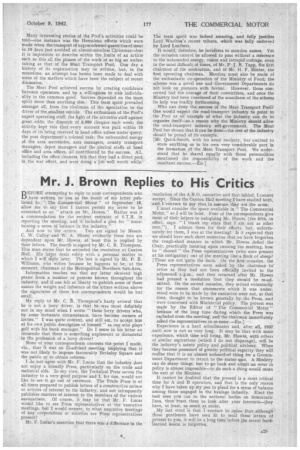Mr. J. Brown Replies to His Critics
Page 31

If you've noticed an error in this article please click here to report it so we can fix it.
BEP-ORE attempting to reply to your correspondents who have written to you as the result of my letter published 'in ".The Commercial Motor" of September 18, allow me to say that I cannot permit my letter to be construed as an "attack on Mr. Howes." Rather was it a commendation for the evident restraint of S.T.R. in reporting the meeting, and it included a plea for " maintaining a sense of balance in the industry."
And now to the ietters. Two are signed by Messrs. C. W. Culley and W. A. Hines; evidently these two are dependent upon Mr. Howes, at least this is implied by their letters. The fourth is signed by Mr. C. R. Thompson. This man states ihat he seconded the resolution at Caxton Hall. His letter deals solely with a personal matter to which I will reply later. The last is signed by Mr. P. R. Williams, who writes becatise he happens to be, at the moment, chairman of the Metropolitan Northern Sub-Area.
Information reaches me that my letter ficeived high praise from a number of persons known throughout the industry, and if one felt at liberty to publish some of these names the weight and influence of the letters written above the signatures of these five correspondents would be but small.
My reply to Mr. C. ft. Thompson's hasty avowal that he is not a lorry driver, is that he was most definitely not in my mind when I wrote " those lorry drivers who, by some fortunate circumstance, have become owners of lorries." I was quite content, and still am, to accept him at his own public description of himself " as one who plays golf with his bank manager." Do I sense in his letter an innuendo that there is something unpleasant or distasteful in the profession of a lorry driver?
None of your correspondents contests the point I made, viz., that it was an ill-advised meeting, implying that it was not likely to impress favourably Berkeley Square and the public or to obtain reforms.
I do not agree with Mr. F. Lucas that the industry does not enjoy a friendly Press, particularly on the trade and technical side. In crny view, the Technical Press serves the industry to a very good purpose and I, for one, would not like to see it go out of existence. The Trade Press is at all times prepared to publish letters of a constructive nature or articles of interest to the industry, and not infrequently publishes matters of interest to the members of the various assoGiations. Of course, it may be that Mr. F. Lucas would like to see Press representatives at the 'executive meetings, but I would answer, to what executive meetings of any corporations or societies are Press. representatives present?
Mr. F. Lucas's assertion that there was a difference in the resolution of the A.R.O. executive and that tabled. I cannot accept. Since the Caxton Hall meeting I have studied both, and. I venture to say that, in essence they are the same.
I must consider the space available in" The Commercial Motor," so I will be brief. Four of the correspondents give most of their letters to eulogizing Mr. Howes (the fifth, in effect, says: " I thank my stars that I am not as other men."). I admire them for their efforts, but, unfortu nately for them, I was at the meeting! Is it expected that we should have such short memories that we have forgotten
the rough-shod manner in which Mr. Howes defied the
Chair, practically insisting upon running the meeting, how he " shooed " the Press representatives (who were present at his instigation) out of the meeting like a flock of sheep?
[These are not quite the facts. On the first occasion, the Press representatives were asked by the chairman to' retire as they had not been officially invited to the adjourned a.g.m., and they returned after Mr. Howes had pressed a resolution that they should be re-admitted, On the second occasion, they retired voluntarily for the reason that statements which it was understood were to be made by the executive were not, at that time, thought to be known generally by the Press, and were concerned with Ministerial policy. The protest was made by the Editor of " The Commercial Motor " because of the long time during which the Press was excluded from the meeting, and the chairman immediately asked the representatives to re-enter.—En.] Experience is a hard schoolmaster and, after all, 1937 ,until now is not so very long. It may be that with more experience, which time will bring, Mr. Howes, with others of similar aspirations (which I do not disparage), will be the industry's astute policy and political advisers. When they become possessed of greater political sagacity they will realize that it is an almost unheard-of thing for a Government Department to return to the status quo. A Ministry can do many things, but to go back and admit an error in policy is almost impossible—to do such a thing would mean the exit of the Minister.
It cannot be doubted that the present is a most critical time for A and B operators, and that is the only reason why I have taken up my pen to plead for a sense of balance among those engaged in the haulage industry. Elect the best men you can to the national bodies on democratic lines, then trust them to look after your interests—they have, at least, as _much at stake.
My last word is that I venture to opine that although these gentlemen have seen fit to send these letters of protest to you, it will be a long time before the recent hard. learned lesson is forgotten.




















































